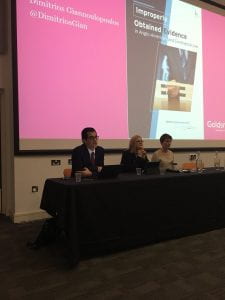What role can psychology play in criminal proceedings, sentencing and the post-sentencing stage? Is criminal justice practice sufficiently informed by psychological research? What can we do to better incorporate evidence-based practice into the criminal justice system and avoid the pitfalls of miscarriages of justice?
These are some of the questions that have been examined in the Psychology and Law conference organised by the Forensic Psychology Unit at Goldsmiths, in association with SL5 Legal, a Law firm with expertise in prison law, human rights, judicial review and parole, and Red Lion Chambers, one of the leading sets specialising in criminal and regulatory law.
The conference, organised by Caoimhe McAnena, a Psychology lecturer at Goldsmiths, brought together psychologists, solicitors, barristers, judges, probation officers and other senior criminal justice experts, including the Law Commissioner for Criminal Law and Evidence in England and Wales, Prof David Ormerod, HH Noel Lucas QC who is the Resident Judge at Wood Green Crown Court and the newly appointed Chair of the Parole Board, Caroline Corby.

from left to right: Prof Dimitrios Giannoulopoulos, SL5’s Fiona Dunkley and Prof Fiona Gabbert
The conference also underlined the emerging collaboration between the Law programme at Goldsmiths and the Forensic Psychology Unit. Head of Law, Prof Dimitrios Giannoulopoulos and Head of Psychology, Prof Fiona Gabbert, paired up in the first panel. Prof Gabbert discussed evidence-based interview skills to elicit reliable information from individuals; how these skills are being adopted into policy and procedure in both local (UK) and global initiatives. Prof Giannoulopoulos highlighted the risk of miscarriages of justice, where self-incriminating statements have been obtained from suspects in violation of their procedural rights. Taking a comparative law perspective, he explained that exclusionary rules for improperly obtained confessional evidence help reduce this risk, but more could be done to avert violations of suspects’ rights in the first place, including placing stronger emphasis on evidence-based interviewing, audio-visual recording of police interviews and police training programmes. Stronger preventive mechanisms would go hand-in-hand with efforts in transnational law to enhance procedural protections for suspects at the police station.
The Law programme at Goldsmiths gives students the opportunity to combine the study of Law with the study of Psychology, through a final year optional module. The ‘Psychology and Law’ module provides the opportunity for advanced study of psychological science applied to the investigation of crime and the process of criminal law, with the syllabus covering current issues in psychology and law, for example: interviewing suspects and witnesses, confessions, detection of deception, eyewitness testimony, eyewitness identification, offender profiling, and CCTV.